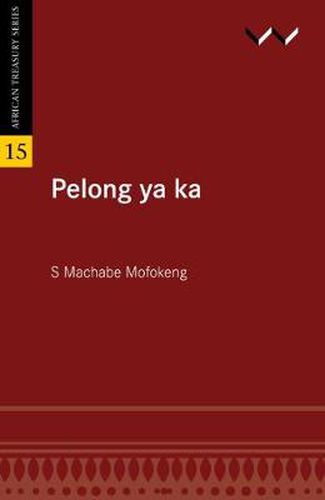Readings Newsletter
Become a Readings Member to make your shopping experience even easier.
Sign in or sign up for free!
You’re not far away from qualifying for FREE standard shipping within Australia
You’ve qualified for FREE standard shipping within Australia
The cart is loading…






Pelong ya Ka, a collection of essays and sketches in Sotho was first published in 1962 in the Bantu Treasury Series Imprint of Witwatersrand University Press. S. Machabe Mofokeng is regarded as one of the greatest essayist and dramatist in Southern Sotho. His first book, Senkatana (a play) was published in 1952.
Pelong ya Ka comprises 20 essays which range from meditative, descriptive, and narrative to polemic style, with the tone of voice characterised by melancholy, humour, and satire. The essays span over a wide range of themes, as suggested by their Titles, e.g. Pelo (The heart), Bodutu (‘Solitude’), Death (‘Lefu’), Nako (‘Time’), Pampiri (‘Paper’), Ho kganna mmotokara (‘Driving an automobile’), Sepetlele (‘Hospital’), Lenyalo (‘Matromony’), and Boqheku (‘Old age’). Nhlanhla Maake says of this collection Mofokeng’s essays fuse simplicity with depth.
$9.00 standard shipping within Australia
FREE standard shipping within Australia for orders over $100.00
Express & International shipping calculated at checkout
Pelong ya Ka, a collection of essays and sketches in Sotho was first published in 1962 in the Bantu Treasury Series Imprint of Witwatersrand University Press. S. Machabe Mofokeng is regarded as one of the greatest essayist and dramatist in Southern Sotho. His first book, Senkatana (a play) was published in 1952.
Pelong ya Ka comprises 20 essays which range from meditative, descriptive, and narrative to polemic style, with the tone of voice characterised by melancholy, humour, and satire. The essays span over a wide range of themes, as suggested by their Titles, e.g. Pelo (The heart), Bodutu (‘Solitude’), Death (‘Lefu’), Nako (‘Time’), Pampiri (‘Paper’), Ho kganna mmotokara (‘Driving an automobile’), Sepetlele (‘Hospital’), Lenyalo (‘Matromony’), and Boqheku (‘Old age’). Nhlanhla Maake says of this collection Mofokeng’s essays fuse simplicity with depth.